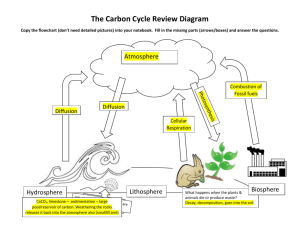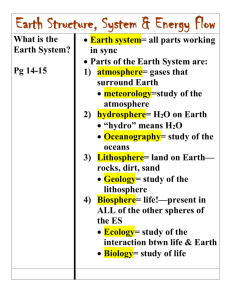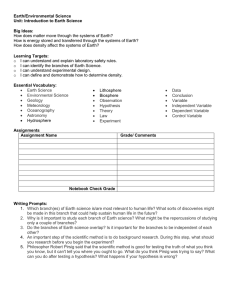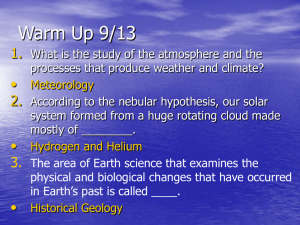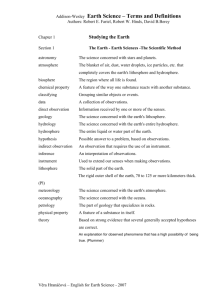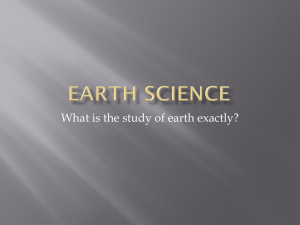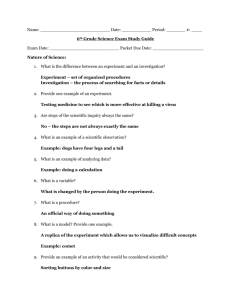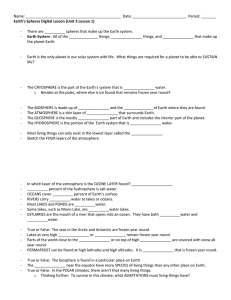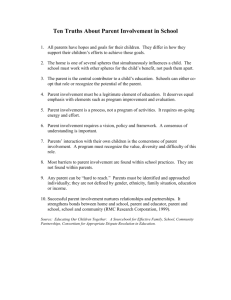We will learn the properties of the spheres of the Earth.
advertisement
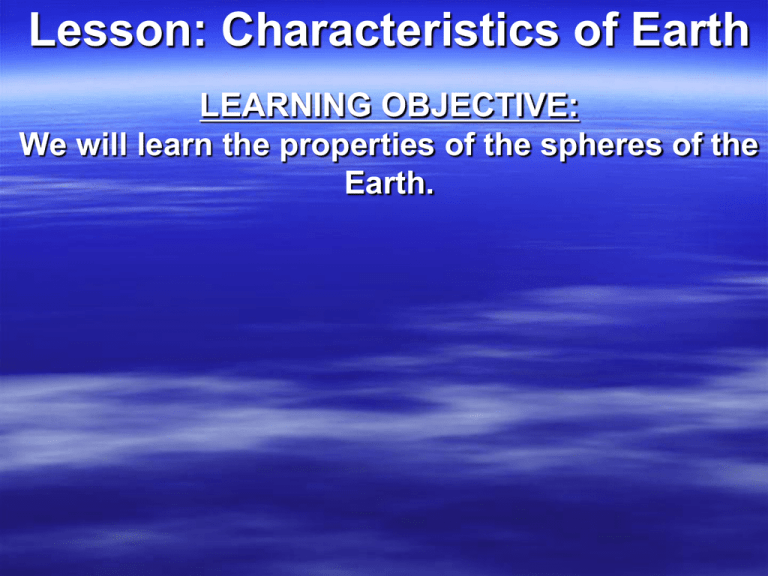
Lesson: Characteristics of Earth LEARNING OBJECTIVE: We will learn the properties of the spheres of the Earth. LEARNING OBJECTIVE: We will learn the properties of the spheres of Earth. WILF: State the spheres of Earth and their chemical composition. State the layers of the atmosphere. State the boundaries between the atmospheric layers. LEARNING OBJECTIVE: We will learn the properties of the spheres of Earth. The Hydrosphere The layer of liquid water on Earth. The hydrosphere consists of the oceans (~70%), lakes, streams, and rivers (~30%). LEARNING OBJECTIVE: We will learn the properties of the spheres of Earth. Composition of the Hydrosphere The chemical composition of the hydrosphere is mostly water. Therefore, it is mostly water and oxygen (H2O) LEARNING OBJECTIVE: We will learn the properties of the spheres of Earth. The Lithosphere The layer of rock that forms the solid outer shell at the top of Earth’s interior. Approximately 100 km thick and divided into sections called lithospheric plates. Upper portion is called the crust. LEARNING OBJECTIVE: We will learn the properties of the spheres of Earth. The Lithosphere The chemical composition of the lithosphere differs based on mass vs. volume. LEARNING OBJECTIVE: We will learn the properties of the spheres of Earth. The Atmosphere The layers of gases that surround Earth above the surface of liquid water and rocky material. LEARNING OBJECTIVE: We will learn the properties of the spheres of Earth. Composition of the Atmosphere ~78% Nitrogen gas ~21% Oxygen gas Some aerosols (suspended liquids and solids) LEARNING OBJECTIVE: We will learn the properties of the spheres of Earth. The atmosphere is the sphere furthest from… The center of Earth. This is because the atmosphere is the least dense and Earth’s gravity pulls on it less than the other spheres. LEARNING OBJECTIVE: We will learn the properties of the spheres of Earth. Layers of the atmosphere: Troposphere Stratosphere Mesosphere Thermosphere *Each layer has its own distinct characteristics: - Temperature - Composition LEARNING OBJECTIVE: We will learn the properties of the spheres of Earth. The boundaries between the layers of the atmosphere are called… Pauses – Tropopause – Stratopause – Mesopause LEARNING OBJECTIVE: We will learn the properties of the spheres of Earth. MULTIPLE-CHOICE QUESTION #1 Which makes up most of Earth’s surface? 1) The atmosphere 2) The lithosphere 3) The hydrosphere LEARNING OBJECTIVE: We will learn the properties of the spheres of Earth. MULTIPLE-CHOICE QUESTION #2 The lower atmosphere and hydrosphere are bound to Earth by 1) Magnetic fields 2) Atmospheric pressure 3) The force of gravity 4) A molecular bonding at the interface LEARNING OBJECTIVE: We will learn the properties of the spheres of Earth. MULTIPLE-CHOICE QUESTION #3 Oxygen is the most abundant element by volume in Earth’s 1) Inner core 2) Crust 3) Hydrosphere 4) Troposphere LEARNING OBJECTIVE: We will learn the properties of the spheres of Earth. MULTIPLE-CHOICE QUESTION #4 What do the tropopause, stratopause, and mesopause all have in common? 1) Each is a point of maximum temperature in its layer of the atmosphere. 2) Each is an interface of two layers of the atmosphere. 3) Each is a region of increasing pressure within the atmosphere. 4) Each is a zone of decreasing water vapor content within the atmosphere. LEARNING OBJECTIVE: We will learn the properties of the spheres of Earth. MULTIPLE-CHOICE QUESTION #5 Which statement most accurately describes Earth’s atmosphere? 1) The atmosphere is layered, with each layer possessing distinct characteristics. 2) The atmosphere is a mass of gases surrounding most of Earth. 3) The atmosphere’s altitude is less than the depth of the ocean. 4) The atmosphere is more dense than the hydrosphere, but less dense than the lithosphere. LEARNING OBJECTIVE: We will learn the properties of the spheres of Earth. MULTIPLE-CHOICE QUESTION #6 The water sphere of Earth is known as the 1) Atmosphere 2) Troposphere 3) Lithosphere 4) Hydrosphere
